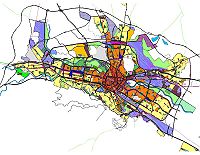
Photo from wikipedia
In Thailand, the concept and measurement of urban planning rely on conventional zoning, which includes land use, building usage, and open space ratio. Conventional zoning focuses on both the growth… Click to show full abstract
In Thailand, the concept and measurement of urban planning rely on conventional zoning, which includes land use, building usage, and open space ratio. Conventional zoning focuses on both the growth of buildings in terms of physical dimensions and their usability in lowland areas. The guidelines and measures used in urban planning do not reflect the spatial relationship of the community, as they have a less detailed design and place no emphasis on the identity of the district. Urban planning might not protect the sense of any given place, as it often uses a one-size-fits-all plan that is then applied to whole communities. Form-Based Codes (FBCs) are urban planning tools that are used to maximize land use, benefit the public, focus on creating a specific physical form, and design the development and public spaces in a way that matches the community’s vision. FBCs are the result of the cooperation between stakeholders, architects, urban planners, government agencies, and members of the local community who are willing to create a plan for their public space and to preserve the physical characteristics of the city. In this paper, we aimed to understand the relationship between various historical contexts and the FBCs using the case study of Phuket’s old town, which has a fusion of Sino–Portuguese architecture. Building form standards suitable for Phuket’s old town were created by comparing them to a baseline case that uses existing codes and regulations and using the FBCs’ components. FBCs have the potential to enhance the character and vibrancy of the historic area by improving facade design and preserving the sense of place and community pride. The results support the hypothesis that FBCs are able to supplement conventional zoning in historic districts. Recommendations for a local historic preservation commission and communities that are considering the adoption of FBCs for historic resources and districts are provided.
Journal Title: Sustainability
Year Published: 2020
Link to full text (if available)
Share on Social Media: Sign Up to like & get
recommendations!